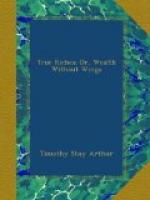“Not happy accidents, Edward,” said Mrs. Claire, with a tender smile; “say, wise providences. There is no such thing as chance.”
“As you will, dear,” returned the husband, with a slight change in his tone. “I would not call that providence wise by which Leonard Jasper became the guardian of a friendless child.”
“This is because you cannot see the end from the beginning, Edward. The Lord’s providence does not regard merely the external comfort and well-being of his creatures; it looks far beyond this, and regards their internal interests. It permits evil and suffering to-day, but only that good, a higher than earthly good, may come on the morrow. It was no blind chance, believe me, my husband, that led to the appointment of Mr. Jasper as the guardian of this poor child. Eternal purposes are involved therein, as surely as God is infinitely wise and good. Good to one, perhaps to many, will grow out of what now seems a deeply to be regretted circumstance.”
“You’re a happy reasoner, Edith. I wish I could believe in so consoling a philosophy.”
“Edward!” There was a change in Mrs. Claire’s voice, and a look blending surprise with a gentle rebuke in her countenance. “Edward, how can you speak so? Is not mine the plain Christian doctrine? Is it not to be found everywhere in the Bible?”
“Doubtless, Edith; but I’m not one of the pious kind, you know.”
Claire forced a smile to his face, but his wife looked serious, and remarked—
“I don’t like to hear you talk so, Edward. There is in it, to me, something profane. Ah, my dear husband, in this simple yet all-embracing doctrine of providence lies the whole secret of human happiness. If our Creator be infinite, wise, and good, he will seek the well-being of his creatures, even though they turn from him to do violence to his laws; and, in his infinite love and wisdom, will so order and arrange events as to make every thing conspire to the end in view. Both bodily and mental suffering are often permitted to take place, as the only agencies by which to counteract hereditary evils that would otherwise destroy the soul.”
“Ah, Edie! Edie!” said Claire, interrupting his wife, in a fond, playful tone, “you are a wise preacher, and as good as you are wise. I only wish that I could see and feel as you do; no doubt it would be better for me in the end. But such a wish is vain.”
“Oh, say not so, dear husband!” exclaimed Edith, with unexpected earnestness; “say not so! It hurts me almost like words of personal unkindness.”
“But how can I be as good as you are? It isn’t in me.”
“I am not good, Edward. There is none good but God,” answered the wife solemnly.
“Oh yes, yes! You are an angel!” returned Claire, with a sudden emotion that he could not control. “And I—and I—”
He checked himself, turned his face partly away to conceal its expression, sat motionless for a moment, and then burying his face on the bosom of his wife, sobbed for the space of nearly a minute, overcome by a passion that he in vain struggled to master.




